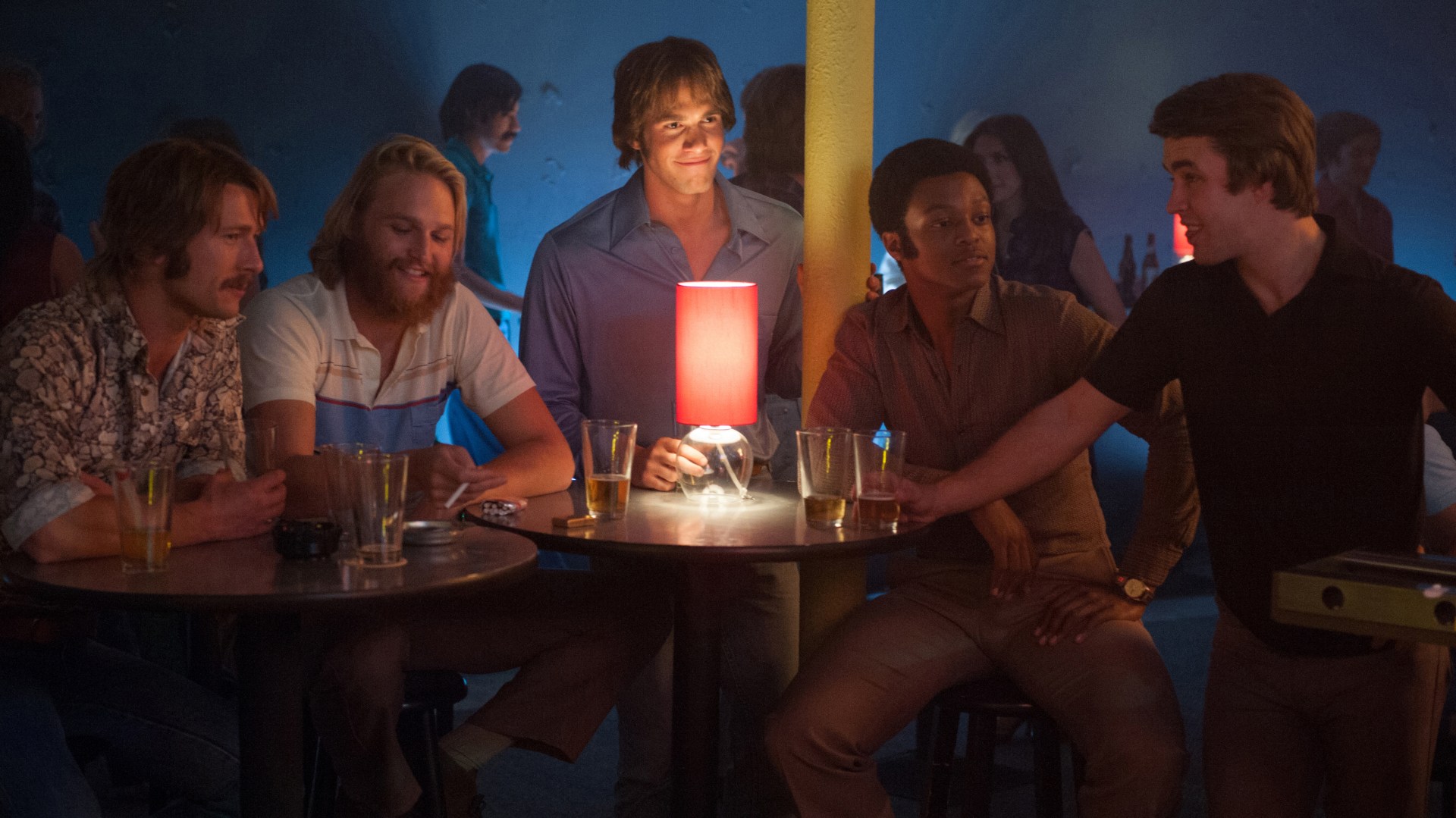There is a locker room scene in the middle of Everybody Wants Some!!, Richard Linklater’s “spiritual sequel” to Dazed and Confused, where freshman pitcher Jake (Blake Jenner) is tricked into lifting his face into another player’s exposed butt cheeks. Jake has a quick flash of anger at the sophomoric prank and then lobs an insult at one of the perpetrators before then trying to replicate the humiliating trick with one of his teammates as the victim.
This scene is not particularly crucial to the film’s story. Like much of Linklater’s work, Everybody relies more on setting and observational detail than narrative. Nor is it a given that everyone watching it will immediately recall accounts of a recently retired NFL quarterback whose own locker room conduct led to a sexual assault complaint. But for those who do, the film invites us to compare the cultural mores and attitudes of the current moment with those of the not so distant past. The gulf between the amount of approbation we feel towards some behaviors and the relative lack of outrage the society of the time felt is a measure of how quickly our sensibilities change.
Let me be clear, though. It isn’t as though Linklater nostalgically defends the early ’80s. The casual drug use, the objectification of women (co-ed mud wrestling!), and the gratuitous flashes of breasts and buttocks are no more cheerfully celebrated than prudishly censured. To the extent the film anticipates an emotional response from our (perhaps) more politically correct culture, it shrugs rather than bristles. This is who we were, it says. This is what we did.
Had Everybody Wants Some!! arrived at a different cultural moment, its unwillingness to censure the lax social standards of the ’80s might have resonated more deeply. Certainly the relative success of Donald Trump’s presidential campaign—complete with swearing, lewd commentary, and men-will-be-boys backlash against propriety—has revealed that a not-insignificant portion of the population feels that political correctness has gone too far. It is still hard, though, for Christian viewers (at least this one) to yearn for an age (or a period in our lives) when women not only accepted their roles as sexual trophies but dressed up as dominatrixes and little girls because it was their job to pander to men’s adolescent fantasies.
Everybody Wants Some!! covers the span of about three days at a fictional Texas university before classes start. Much like Before Midnight (and to some extent, the end of Boyhood), it is a film about holding off adulthood and its dreary responsibilities for as long as possible. The final 15 minutes of the film show that Jake is not totally unequipped intellectually or educationally to enter into adulthood. Emotionally and socially? That’s a different matter. And the final shots as Jake eventually enters into the classroom (with all its attendant symbolism) may cause us to question how serious he is about the life philosophy he just espoused to his would-be girlfriend. The film isn’t so much about the godless university stripping the innocent of their moral compass. It’s not God’s (Not) Dead. It’s more about loosely held cultural assumptions crumbling in the face of actual life experience.
Few historical events complicate our moral decision making like war, and Cassie Bryant’s documentary, The Liberators, gives us a documentary version of a culture wrestling with its evolving notions of what constitutes civilized behavior.
Joe Meador, the American officer who stole a number of cultural treasures from an abbey in Quedlinburg, Germany at the close of World War II, is not depicted as a monster. Far from it. As the film explains, plunder has a history as old as war itself, and the notion that the spoils of war should be enjoyed only by nations and not individual soldiers is a relatively new proposition. But it may be hard for audiences to separate the strong association of war profiteering with persecution, built over decades and reinforced by films such as The Monuments Men, Septembers of Shiraz, and Woman in Gold.
Writer Cassie Hay suggested in an interview that the fact that the Quedlinburg treasures are specifically religious icons may also influence American audiences’ sympathy. If the stealing of art treasures is strongly associated with Nazism, the destruction of religious items is topical because of the Taliban’s destruction of Buddhist statues. (See Hana Makhmalbaf’s Buddha Collapsed Out of Shame for a film with actual footage of religiously motivated destruction of cultural artifacts.)
The audience’s feelings may be further complicated by the actions of Meador’s family upon “inheriting” the artifacts and the justifications offered up by the lawyers whose job it is to look out for their clients’ best interests rather than to adjudicate morality.
Is it even relevant to any of these discussions that Meador turns out to have been a gay man living in a small Texas town in the 1950s? Our cultural narratives about who is the victim and who is the victimizer rarely admit much nuance or incorporate accounts of experiences that deviate from the norm.
Documentaries like The Liberators and films like Everybody Wants Some!! remind us to at least try to place individual stories in a historical context before we judge the people in them.
Kenneth R. Morefield (@kenmorefield) is an Associate Professor of English at Campbell University. He is the editor of Faith and Spirituality in Masters of World Cinema, Volumes I, II, & III, and the founder of 1More Film Blog.









